My blog is now an adult: 21 years old and legally able to drink and enter into binding contracts. Still too young to run for president, though.
So what should my blog do to celebrate?
Cats, charts, and politics

My blog is now an adult: 21 years old and legally able to drink and enter into binding contracts. Still too young to run for president, though.
So what should my blog do to celebrate?
We all know that NAEP test scores dropped substantially between 2019 and 2022, largely due to virtual teaching replacing in-person teaching. At least, that's what we think happened.
I got curious about this the other day: Did states that kept schools open during the 2020-2021 school year do better than states that closed schools? First, here is an "in-person" teaching index from Burbio. I've included the top ten and bottom ten states:
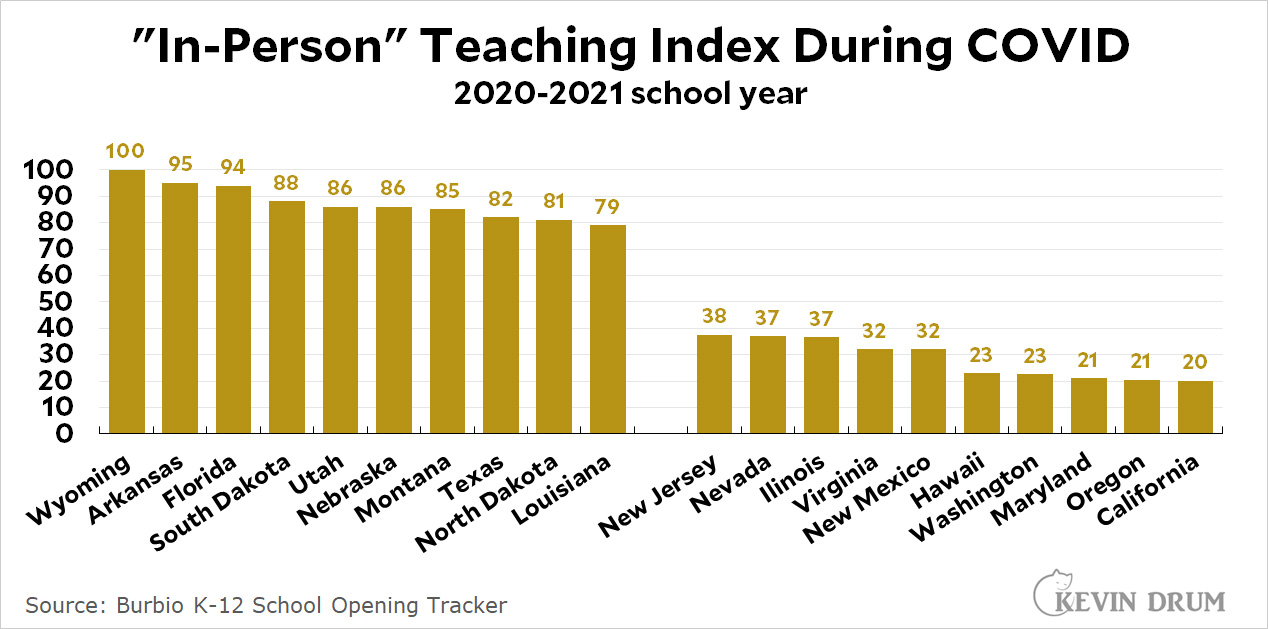 Now, for the same states, here's the change in NAEP reading scores for 8th graders. This compares scores from before and after the pandemic:
Now, for the same states, here's the change in NAEP reading scores for 8th graders. This compares scores from before and after the pandemic:
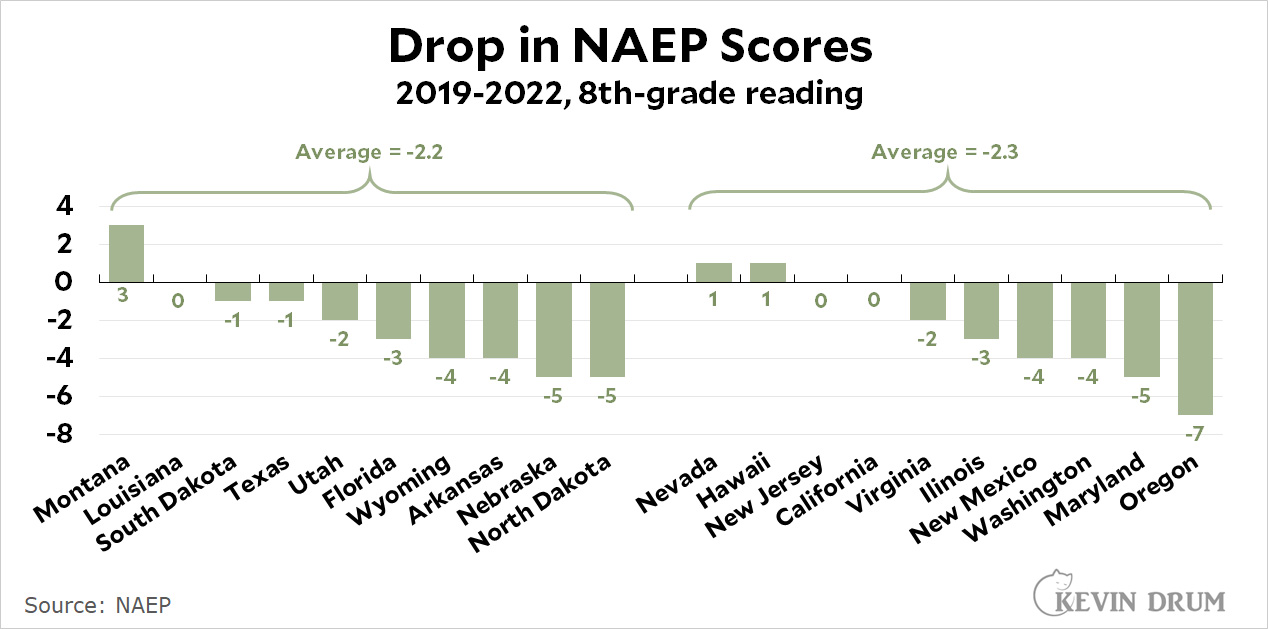
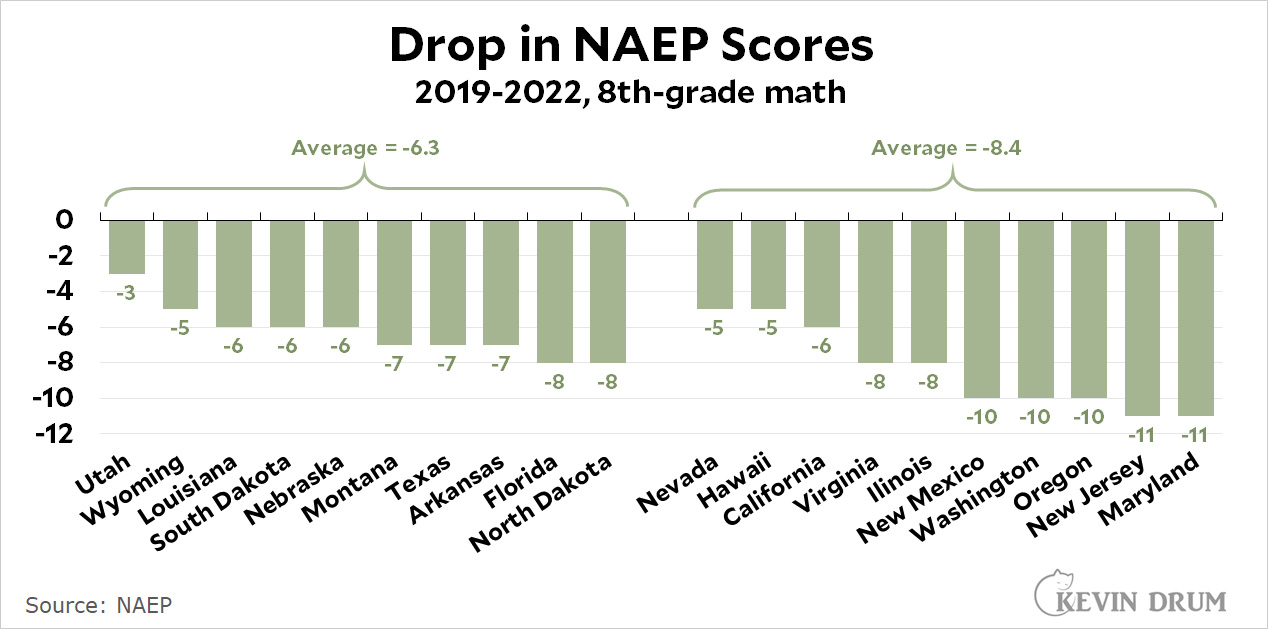 In reading, the average score decline in the top states was -2.2, The average in the worst states was -2.3. In other words, there was no difference.
In reading, the average score decline in the top states was -2.2, The average in the worst states was -2.3. In other words, there was no difference.
In math, the average score decline in the top states was -6.3. The average in the worst states was -8.4. There was more difference in math, but it was small and every single state declined. There's nothing to write home about here.
Here's a different way of looking at it:
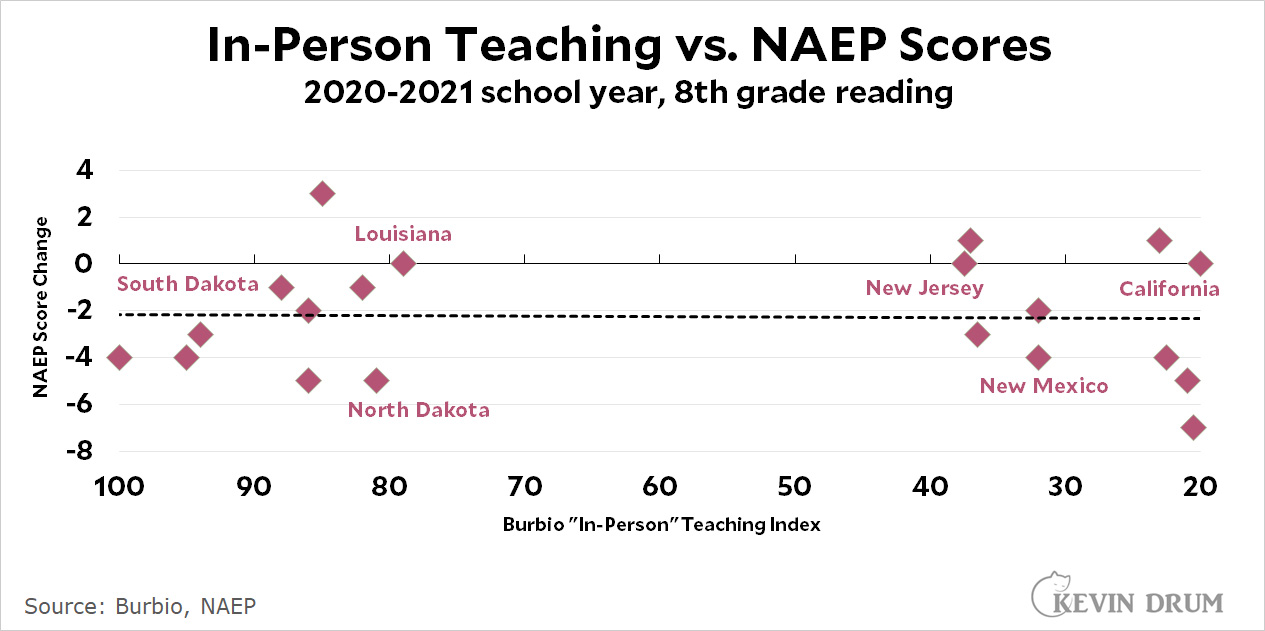 There's just nothing there. If I were less lazy I'd do a scatterplot for all 50 states, but I really doubt we'd see anything much different. Despite all the conventional wisdom, it looks like closing schools really didn't make much difference. Something else about COVID was responsible for the score declines.
There's just nothing there. If I were less lazy I'd do a scatterplot for all 50 states, but I really doubt we'd see anything much different. Despite all the conventional wisdom, it looks like closing schools really didn't make much difference. Something else about COVID was responsible for the score declines.
POSTSCRIPT: The best test scores in reading were in military schools, which went up 2 points. The worst were in Maine, which dropped -8 points. The national average was -3 points.
The best test scores in math were once again in military schools, which stayed even at 0 points. The worst were in Delaware, which dropped -13 points. The national average was -8 points.
This is going to sound weird, but hear me out. There are upwards of 4,300 religions in the world, and even faithful churchgoers don't believe in 4,299 of them. My only difference with them is that I don't believe in 4,300.
Is that really such a big deal?
Why are so many people writing that Donald Trump was the winner of Wednesday's debate? Are they just on autopilot? I've seen no evidence, either anecdotal or in poll numbers, that he benefited in any way from his absence.
He might not have been harmed by his absence either, but that hardly means he "won."
Fed chair Jerome Powell is still hawkish on inflation:
In a highly anticipated speech at the Fed’s annual conference in Jackson Hole, Powell vowed that the central bank has not lost its resolve to cool inflation to 2 percent, even as annual measures of price increases have steadily dropped to roughly 3 percent.
That progress is “welcome, but two months of good data are only the beginning of what it will take to build confidence that inflation is moving down sustainably toward our goal,” he told the audience in the room, largely made up of global central bankers and economists, but also the world.
Two months? Let's roll the tape:
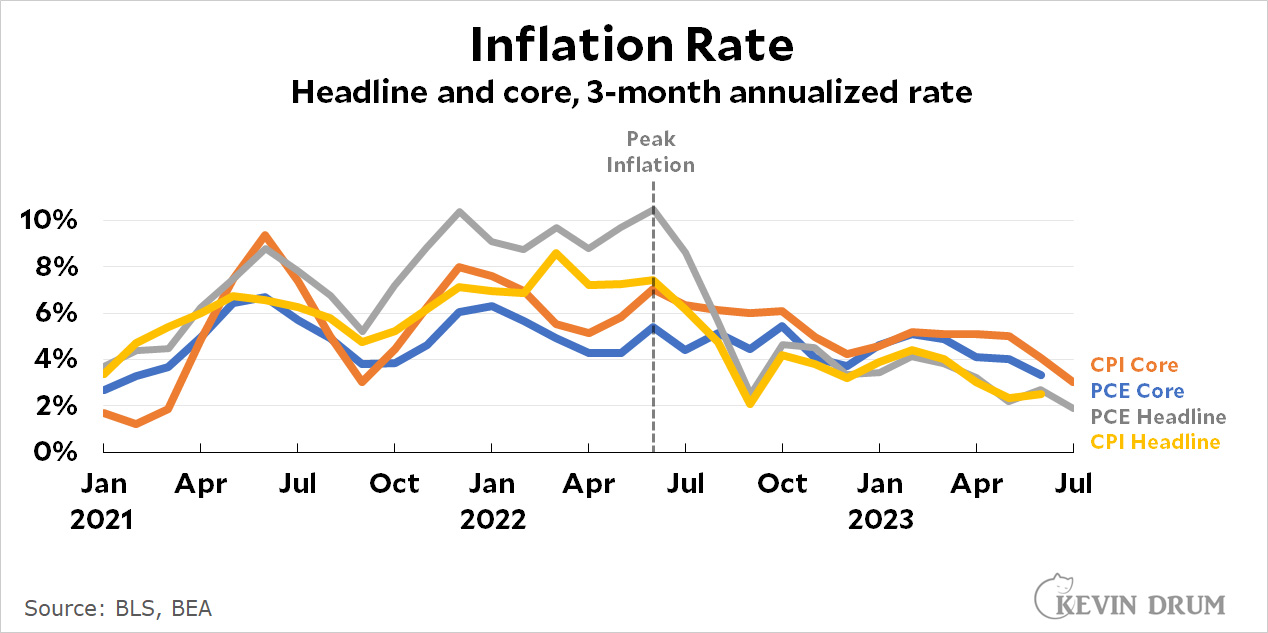 Every measure of inflation peaked (approximately) in June 2021. That's 12 months of good news.
Every measure of inflation peaked (approximately) in June 2021. That's 12 months of good news.
This is true no matter what measure of inflation you use. I chose to look at three-month averages in order to get a good idea of where inflation really is at specific points in time¹—and currently, this shows that every single measure of inflation is between 2% and 3%. How much good news does Powell need?
¹The more common year-over-year measure only tells us the average over the past 12 months. That's not very helpful if you want to know what inflation is like right now.
For what it's worth, if you insist on year-over-year figures, headline inflation still peaked last June while core inflation peaked in September.
UPDATE: The original chart was misdrawn and showed 2-month inflation, not 3-month. It has been corrected.
Here is a Twitter conversation I had yesterday:



 Chris Geidner's tweet sort of proves my point. He makes a loathsome accusation that I must be anti-trans simply because I have some issues with the most extreme factions of trans activism. I feel like I should hardly need to say this, but I'm entirely pro-trans and favor them being treated without bigotry or unfairness in nearly every possible way.
Chris Geidner's tweet sort of proves my point. He makes a loathsome accusation that I must be anti-trans simply because I have some issues with the most extreme factions of trans activism. I feel like I should hardly need to say this, but I'm entirely pro-trans and favor them being treated without bigotry or unfairness in nearly every possible way.
But no matter how much you believe in a principle, there are always difficult edge cases. This is just life in an imperfect world. Free speech is not absolute. Neither is gun ownership. Or even abortion, about which I have about the most extreme pro-choice position imaginable.
But if you express even modest doubts about trans rights edge cases you're likely to be accused by trans activists of "erasing" them. Or "literally" doing violence against them. Or being complicit in their murder. For examples of this, you need go no further than the hundreds of replies to my tweet.
For the sake of clarity, here are three trans edge cases that I consider legitimate:
Sports. If you've grown up as a man, it means you've grown up with testosterone coursing through your body. This gives you more strength and stamina than most women, which is why men's and women's sports were segregated in the first place. There would be no women's sports if we did otherwise. The same is true for someone who transitions to female after puberty: no matter what drugs they take, they're almost certainly more muscular than most women. It's difficult to say just where the line should be drawn, but the basic argument about unfairness is pretty obvious.
Minors. Minors are always an edge case, and once again the reasons are pretty obvious: They don't have fully developed brains or fully grown yardsticks of what's urgent and what's transitory. This makes treatment of trans minors a tricky subject, especially in view of the questions that have recently caused many liberal European countries to retreat on gender affirming care for minors. America's red-state cranks have, as usual, gone way overboard in creating new laws forbidding trans medical treatment for minors, but that doesn't mean more moderate questions about the right way to treat minors don't have some reasonable arguments behind them.
Free association. This is tricky, but there are women who want to socialize in certain circumstances with others who grew up as girls. This is because their backgrounds and experiences will be different from those who grew up as boys, and they will sympathize with their reminiscences and complaints differently. This is truly a difficult issue, however, since free association has so often been a mask for simple bigotry.
I've been wary of trans activism for many years, ever since Lynn Conway and Andrea James launched a vicious jihad against James Bailey because he wrote about scientific research they considered harmful to the trans cause. Not necessarily wrong, mind you, but unhelpful. And that meant he must be not just mistaken, but a monster.
This is typical of trans responses to research in their field: praise it if it helps the cause, demonize it if it doesn't. This is hardly uncommon among activists of all stripes, but that doesn't make it any better. If research is clearly wrong or biased, that's one thing. But condemning something just because it causes problems for the approved narrative is quite another.
The cruel and abhorrent attacks on trans people that have skyrocketed over the past few years among right-wingers is enough to make me sympathetic to almost any response. Unfortunately, attacking indiscriminately against even arguably legitimate criticism does nothing except make the wingers look more like the reasonable ones. It's unhelpful.
A federal judge on Thursday dismissed a Republican National Committee lawsuit alleging that Google’s email spam filters illegally suppressed their missives, dealing the campaign group a crushing blow in a lengthy battle that has riled conservative lawmakers in Washington.
U.S. District Court Judge Daniel Calabretta wrote that while it was a “close case,” the RNC had not “sufficiently pled that Google acted in bad faith” by filtering their messages into spam filters in its popular Gmail service.
Calabretta is a Democratic appointee, so naturally he ruled against the Republicans. But I'm not sure he had much choice anyway. Despite his pro forma claim that this was a "close case," it was probably a slam dunk. Google is a private company and its spam algorithms were created years ago with no political effects in mind.
The real problem is that Republican emails tend to be more spammy than Democratic emails. Live by the spam, die by the spam.
Last night at the Republican debate Martha MacCallum asked: "Do you believe human behavior is causing climate change? Raise your hand if you do."
 No one raised their hand. Luckily for all of them, Ron DeSantis immediately interrupted to pretend he was offended by the whole "raise your hand" trope, which got everyone off the hook.
No one raised their hand. Luckily for all of them, Ron DeSantis immediately interrupted to pretend he was offended by the whole "raise your hand" trope, which got everyone off the hook.
In the end, the only candidate who admitted climate change was real was Nikki Haley, who immediately made it clear she didn't actually want to do anything about it:
If you go want to go and really change the environment, then we need to start telling China and India that they have to lower their emissions.
Real profiles in courage up on that stage.
Here's a popular tweet making the rounds:
How populist "entrepreneur" Vivek Ramaswamy got rich:
1. Found biotech firm with hedge fund/venture capital $
2. Buy patent for Alzheimer's drug that had failed 4 trials, raise more $ to take to market
3. Take company public, cash out
4. Drug fails 5th trial, investors wiped out.— Matthew Gertz (@MattGertz) August 24, 2023
This is actually all true, but it's not the whole story. In 2014, after working for a hedge fund as a biotech investor, Ramaswamy started up Roivant Sciences, which was originally intended to buy the rights to castoff drugs and then continue developing them. His first deal was completed by a Roivant subsidiary called Axovant. Among other things, Ramaswamy:
Unsurprisingly, intepirdine failed yet another clinical trial and Axovant collapsed. Before that happened, however, it had made a bunch of money for Ramaswamy in the space of a mere 12 months. Not bad!
However, as ugly as that was, it's only one part of Roivant. Through its myriad subsidiaries, Roivant bought a lot of drugs and has successfully brought several to market with more on the way. But Roivant also branched out. A subsidiary called Datavant, for example, helps researchers share clinical data securely. By 2021 it had $700 million in revenue and merged with Ciox Health in a deal valued at $7 billion. Roivant has also developed other data products over the past few years. It went public a couple of years ago and is currently trading at more than 70% above its IPO price:
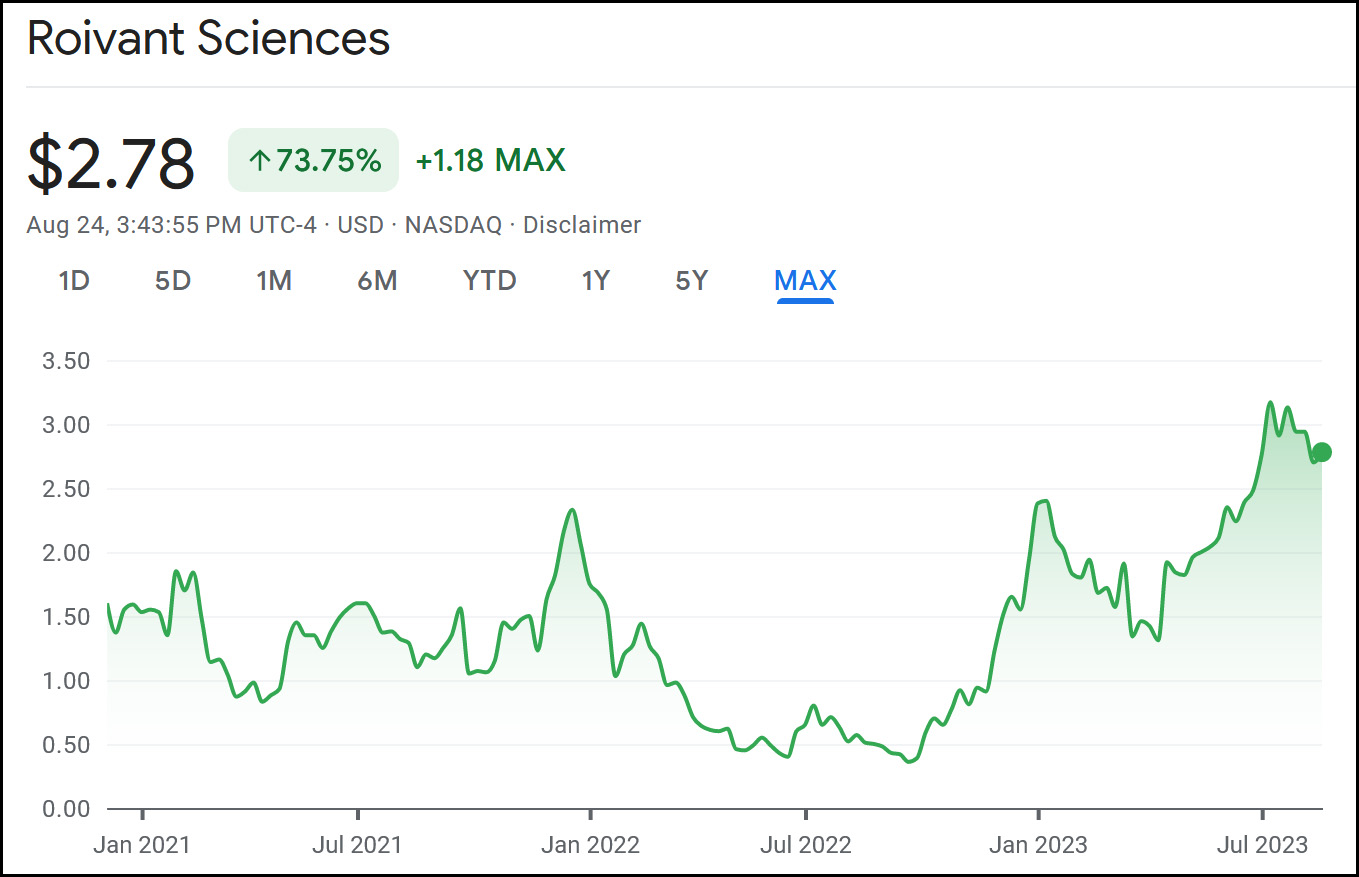 Ramaswamy certainly has a silver tongue, but there's more to him than that. His Alzheimer's play failed spectacularly, but he had plenty of other irons in the fire:
Ramaswamy certainly has a silver tongue, but there's more to him than that. His Alzheimer's play failed spectacularly, but he had plenty of other irons in the fire:
Mr. Ramaswamy’s resilience was in part a result of the savvy way he structured his web of biotechnology companies. But it also highlights his particular skills in generating hype, hope and risky speculation in an industry that feeds on all three. “A lot of it had substance. Some of it did not. He’s a sort of a Music Man,” said Kathleen Sebelius, a Democrat and former health secretary during the Obama administration who advised two of Mr. Ramaswamy’s companies.
Ramaswamy still has a stake in Roivant, which accounts for about half of his billion-dollar fortune. The other half comes from money he made along the way.